Importance of Business Ethics for Sustainable Growth - Academic Report
VerifiedAdded on 2023/06/09
|13
|3410
|300
AI Summary
This academic report highlights the importance of business ethics and how they guide businesses towards sustainable growth. It emphasizes the role of ethics in recruitment, customer satisfaction, communication, and decision making. The report also provides examples of ethical firms like Patagonia and discusses the impact of unethical practices like the recent H&M controversy. The report concludes that a strong ethical policy is essential for long-term sustainability and success of any organization.
Contribute Materials
Your contribution can guide someone’s learning journey. Share your
documents today.

Ethics in business
Academic report
Academic report
Secure Best Marks with AI Grader
Need help grading? Try our AI Grader for instant feedback on your assignments.
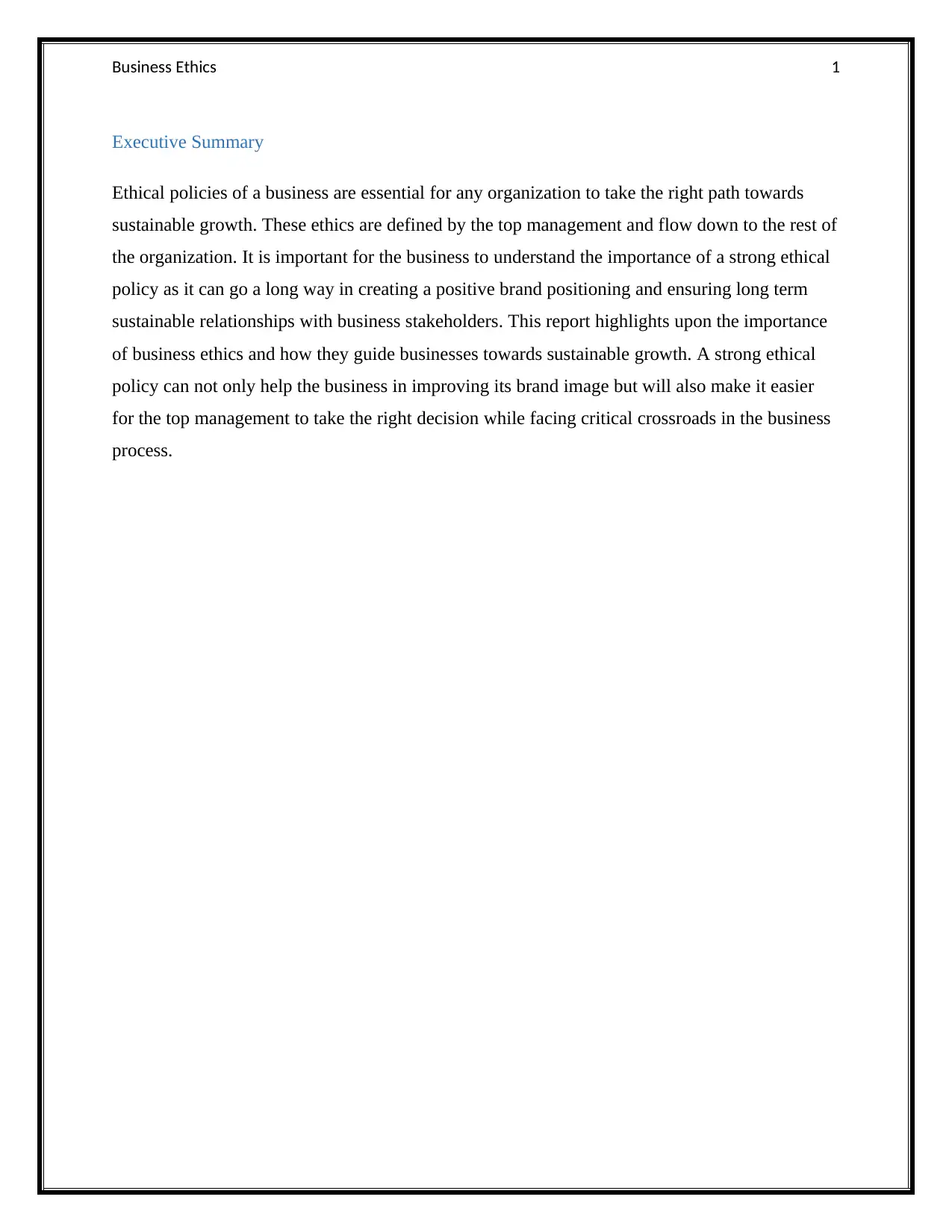
Business Ethics 1
Executive Summary
Ethical policies of a business are essential for any organization to take the right path towards
sustainable growth. These ethics are defined by the top management and flow down to the rest of
the organization. It is important for the business to understand the importance of a strong ethical
policy as it can go a long way in creating a positive brand positioning and ensuring long term
sustainable relationships with business stakeholders. This report highlights upon the importance
of business ethics and how they guide businesses towards sustainable growth. A strong ethical
policy can not only help the business in improving its brand image but will also make it easier
for the top management to take the right decision while facing critical crossroads in the business
process.
Executive Summary
Ethical policies of a business are essential for any organization to take the right path towards
sustainable growth. These ethics are defined by the top management and flow down to the rest of
the organization. It is important for the business to understand the importance of a strong ethical
policy as it can go a long way in creating a positive brand positioning and ensuring long term
sustainable relationships with business stakeholders. This report highlights upon the importance
of business ethics and how they guide businesses towards sustainable growth. A strong ethical
policy can not only help the business in improving its brand image but will also make it easier
for the top management to take the right decision while facing critical crossroads in the business
process.
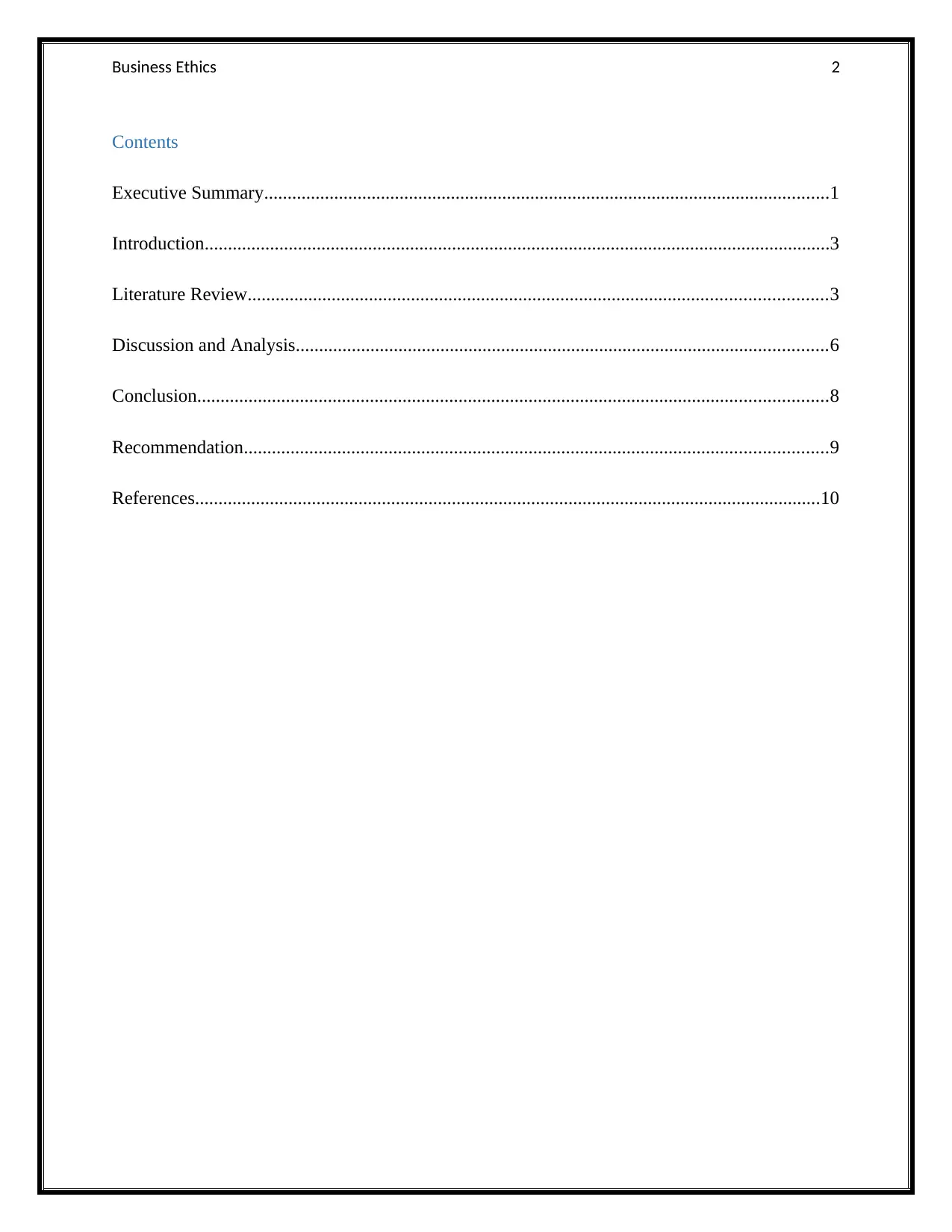
Business Ethics 2
Contents
Executive Summary.........................................................................................................................1
Introduction......................................................................................................................................3
Literature Review............................................................................................................................3
Discussion and Analysis..................................................................................................................6
Conclusion.......................................................................................................................................8
Recommendation.............................................................................................................................9
References......................................................................................................................................10
Contents
Executive Summary.........................................................................................................................1
Introduction......................................................................................................................................3
Literature Review............................................................................................................................3
Discussion and Analysis..................................................................................................................6
Conclusion.......................................................................................................................................8
Recommendation.............................................................................................................................9
References......................................................................................................................................10
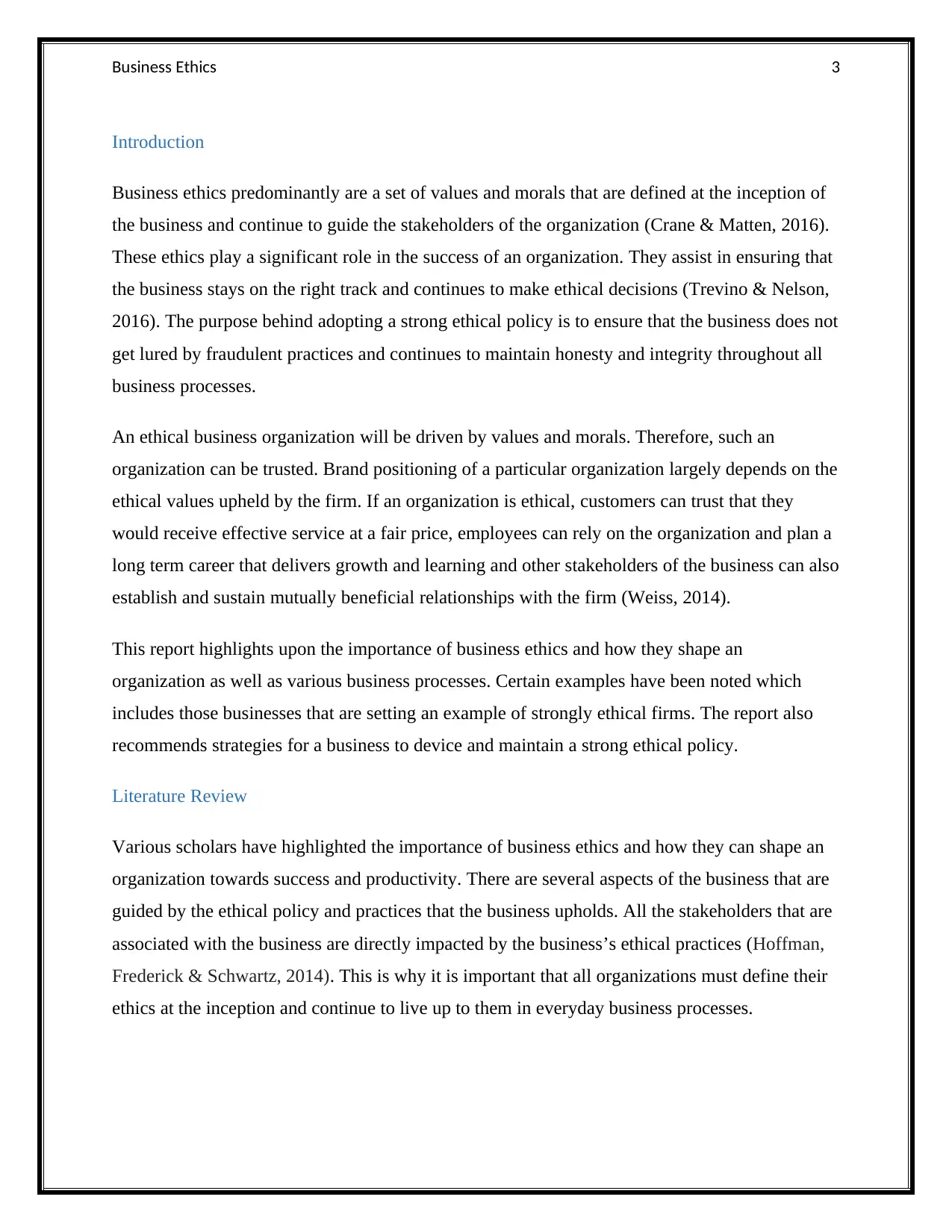
Business Ethics 3
Introduction
Business ethics predominantly are a set of values and morals that are defined at the inception of
the business and continue to guide the stakeholders of the organization (Crane & Matten, 2016).
These ethics play a significant role in the success of an organization. They assist in ensuring that
the business stays on the right track and continues to make ethical decisions (Trevino & Nelson,
2016). The purpose behind adopting a strong ethical policy is to ensure that the business does not
get lured by fraudulent practices and continues to maintain honesty and integrity throughout all
business processes.
An ethical business organization will be driven by values and morals. Therefore, such an
organization can be trusted. Brand positioning of a particular organization largely depends on the
ethical values upheld by the firm. If an organization is ethical, customers can trust that they
would receive effective service at a fair price, employees can rely on the organization and plan a
long term career that delivers growth and learning and other stakeholders of the business can also
establish and sustain mutually beneficial relationships with the firm (Weiss, 2014).
This report highlights upon the importance of business ethics and how they shape an
organization as well as various business processes. Certain examples have been noted which
includes those businesses that are setting an example of strongly ethical firms. The report also
recommends strategies for a business to device and maintain a strong ethical policy.
Literature Review
Various scholars have highlighted the importance of business ethics and how they can shape an
organization towards success and productivity. There are several aspects of the business that are
guided by the ethical policy and practices that the business upholds. All the stakeholders that are
associated with the business are directly impacted by the business’s ethical practices (Hoffman,
Frederick & Schwartz, 2014). This is why it is important that all organizations must define their
ethics at the inception and continue to live up to them in everyday business processes.
Introduction
Business ethics predominantly are a set of values and morals that are defined at the inception of
the business and continue to guide the stakeholders of the organization (Crane & Matten, 2016).
These ethics play a significant role in the success of an organization. They assist in ensuring that
the business stays on the right track and continues to make ethical decisions (Trevino & Nelson,
2016). The purpose behind adopting a strong ethical policy is to ensure that the business does not
get lured by fraudulent practices and continues to maintain honesty and integrity throughout all
business processes.
An ethical business organization will be driven by values and morals. Therefore, such an
organization can be trusted. Brand positioning of a particular organization largely depends on the
ethical values upheld by the firm. If an organization is ethical, customers can trust that they
would receive effective service at a fair price, employees can rely on the organization and plan a
long term career that delivers growth and learning and other stakeholders of the business can also
establish and sustain mutually beneficial relationships with the firm (Weiss, 2014).
This report highlights upon the importance of business ethics and how they shape an
organization as well as various business processes. Certain examples have been noted which
includes those businesses that are setting an example of strongly ethical firms. The report also
recommends strategies for a business to device and maintain a strong ethical policy.
Literature Review
Various scholars have highlighted the importance of business ethics and how they can shape an
organization towards success and productivity. There are several aspects of the business that are
guided by the ethical policy and practices that the business upholds. All the stakeholders that are
associated with the business are directly impacted by the business’s ethical practices (Hoffman,
Frederick & Schwartz, 2014). This is why it is important that all organizations must define their
ethics at the inception and continue to live up to them in everyday business processes.
Secure Best Marks with AI Grader
Need help grading? Try our AI Grader for instant feedback on your assignments.
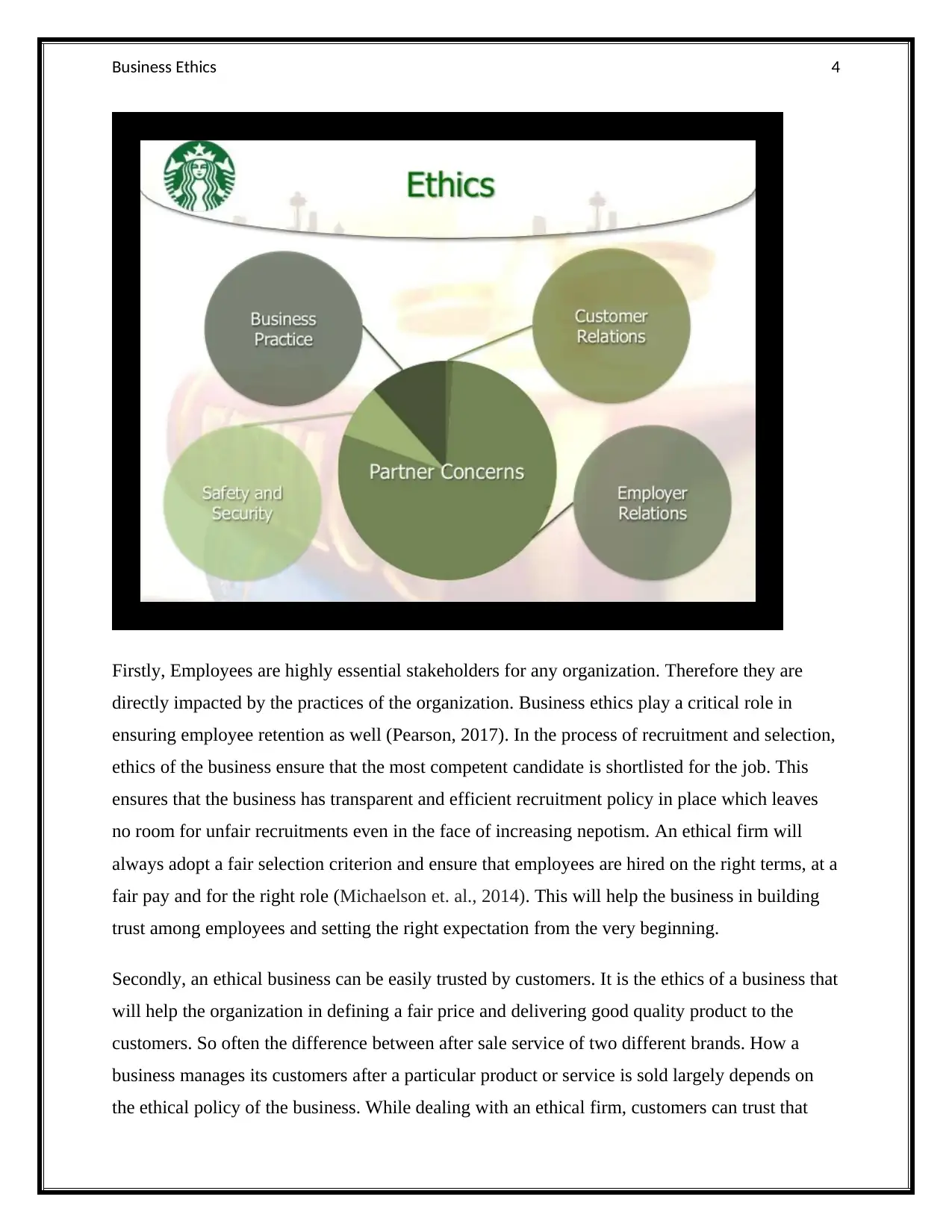
Business Ethics 4
Firstly, Employees are highly essential stakeholders for any organization. Therefore they are
directly impacted by the practices of the organization. Business ethics play a critical role in
ensuring employee retention as well (Pearson, 2017). In the process of recruitment and selection,
ethics of the business ensure that the most competent candidate is shortlisted for the job. This
ensures that the business has transparent and efficient recruitment policy in place which leaves
no room for unfair recruitments even in the face of increasing nepotism. An ethical firm will
always adopt a fair selection criterion and ensure that employees are hired on the right terms, at a
fair pay and for the right role (Michaelson et. al., 2014). This will help the business in building
trust among employees and setting the right expectation from the very beginning.
Secondly, an ethical business can be easily trusted by customers. It is the ethics of a business that
will help the organization in defining a fair price and delivering good quality product to the
customers. So often the difference between after sale service of two different brands. How a
business manages its customers after a particular product or service is sold largely depends on
the ethical policy of the business. While dealing with an ethical firm, customers can trust that
Firstly, Employees are highly essential stakeholders for any organization. Therefore they are
directly impacted by the practices of the organization. Business ethics play a critical role in
ensuring employee retention as well (Pearson, 2017). In the process of recruitment and selection,
ethics of the business ensure that the most competent candidate is shortlisted for the job. This
ensures that the business has transparent and efficient recruitment policy in place which leaves
no room for unfair recruitments even in the face of increasing nepotism. An ethical firm will
always adopt a fair selection criterion and ensure that employees are hired on the right terms, at a
fair pay and for the right role (Michaelson et. al., 2014). This will help the business in building
trust among employees and setting the right expectation from the very beginning.
Secondly, an ethical business can be easily trusted by customers. It is the ethics of a business that
will help the organization in defining a fair price and delivering good quality product to the
customers. So often the difference between after sale service of two different brands. How a
business manages its customers after a particular product or service is sold largely depends on
the ethical policy of the business. While dealing with an ethical firm, customers can trust that
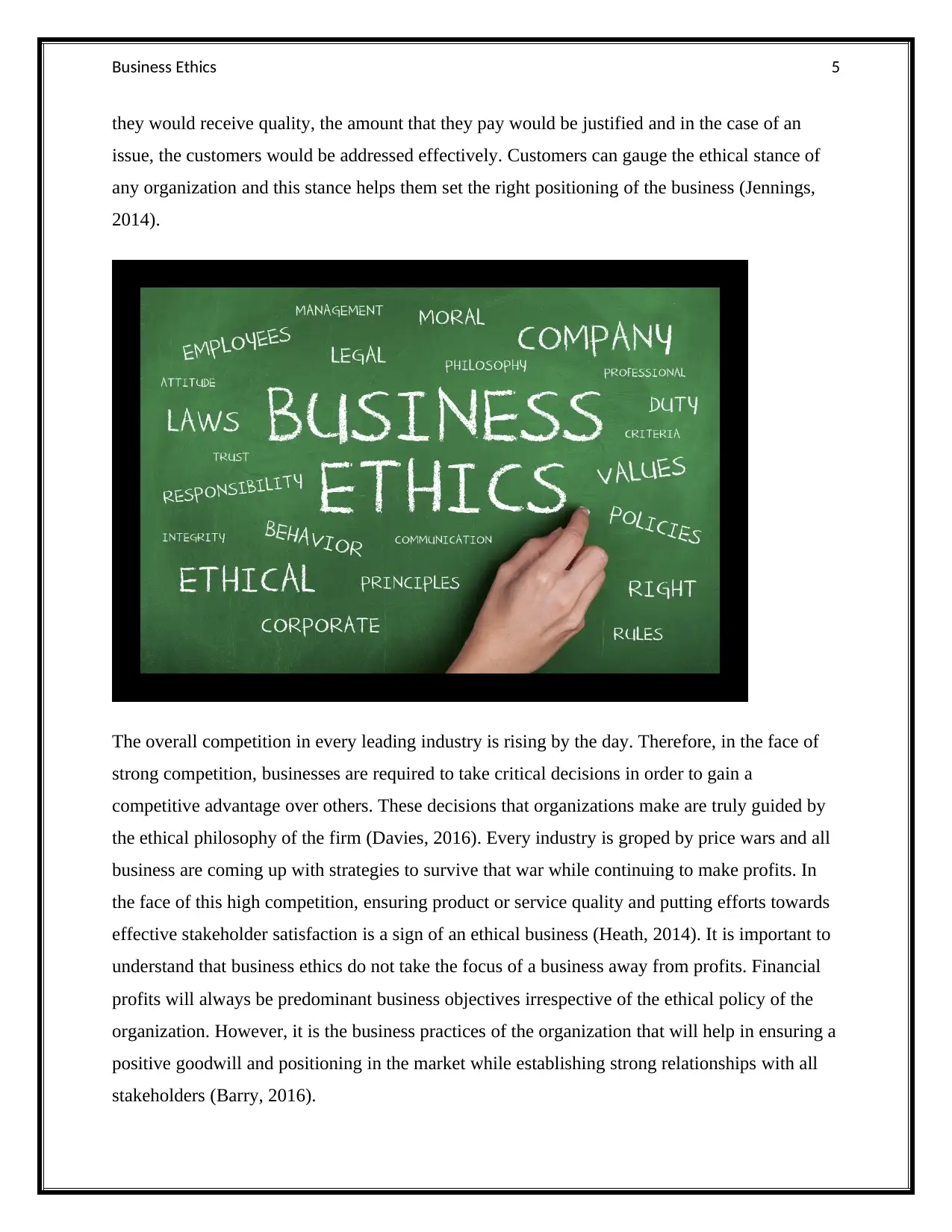
Business Ethics 5
they would receive quality, the amount that they pay would be justified and in the case of an
issue, the customers would be addressed effectively. Customers can gauge the ethical stance of
any organization and this stance helps them set the right positioning of the business (Jennings,
2014).
The overall competition in every leading industry is rising by the day. Therefore, in the face of
strong competition, businesses are required to take critical decisions in order to gain a
competitive advantage over others. These decisions that organizations make are truly guided by
the ethical philosophy of the firm (Davies, 2016). Every industry is groped by price wars and all
business are coming up with strategies to survive that war while continuing to make profits. In
the face of this high competition, ensuring product or service quality and putting efforts towards
effective stakeholder satisfaction is a sign of an ethical business (Heath, 2014). It is important to
understand that business ethics do not take the focus of a business away from profits. Financial
profits will always be predominant business objectives irrespective of the ethical policy of the
organization. However, it is the business practices of the organization that will help in ensuring a
positive goodwill and positioning in the market while establishing strong relationships with all
stakeholders (Barry, 2016).
they would receive quality, the amount that they pay would be justified and in the case of an
issue, the customers would be addressed effectively. Customers can gauge the ethical stance of
any organization and this stance helps them set the right positioning of the business (Jennings,
2014).
The overall competition in every leading industry is rising by the day. Therefore, in the face of
strong competition, businesses are required to take critical decisions in order to gain a
competitive advantage over others. These decisions that organizations make are truly guided by
the ethical philosophy of the firm (Davies, 2016). Every industry is groped by price wars and all
business are coming up with strategies to survive that war while continuing to make profits. In
the face of this high competition, ensuring product or service quality and putting efforts towards
effective stakeholder satisfaction is a sign of an ethical business (Heath, 2014). It is important to
understand that business ethics do not take the focus of a business away from profits. Financial
profits will always be predominant business objectives irrespective of the ethical policy of the
organization. However, it is the business practices of the organization that will help in ensuring a
positive goodwill and positioning in the market while establishing strong relationships with all
stakeholders (Barry, 2016).
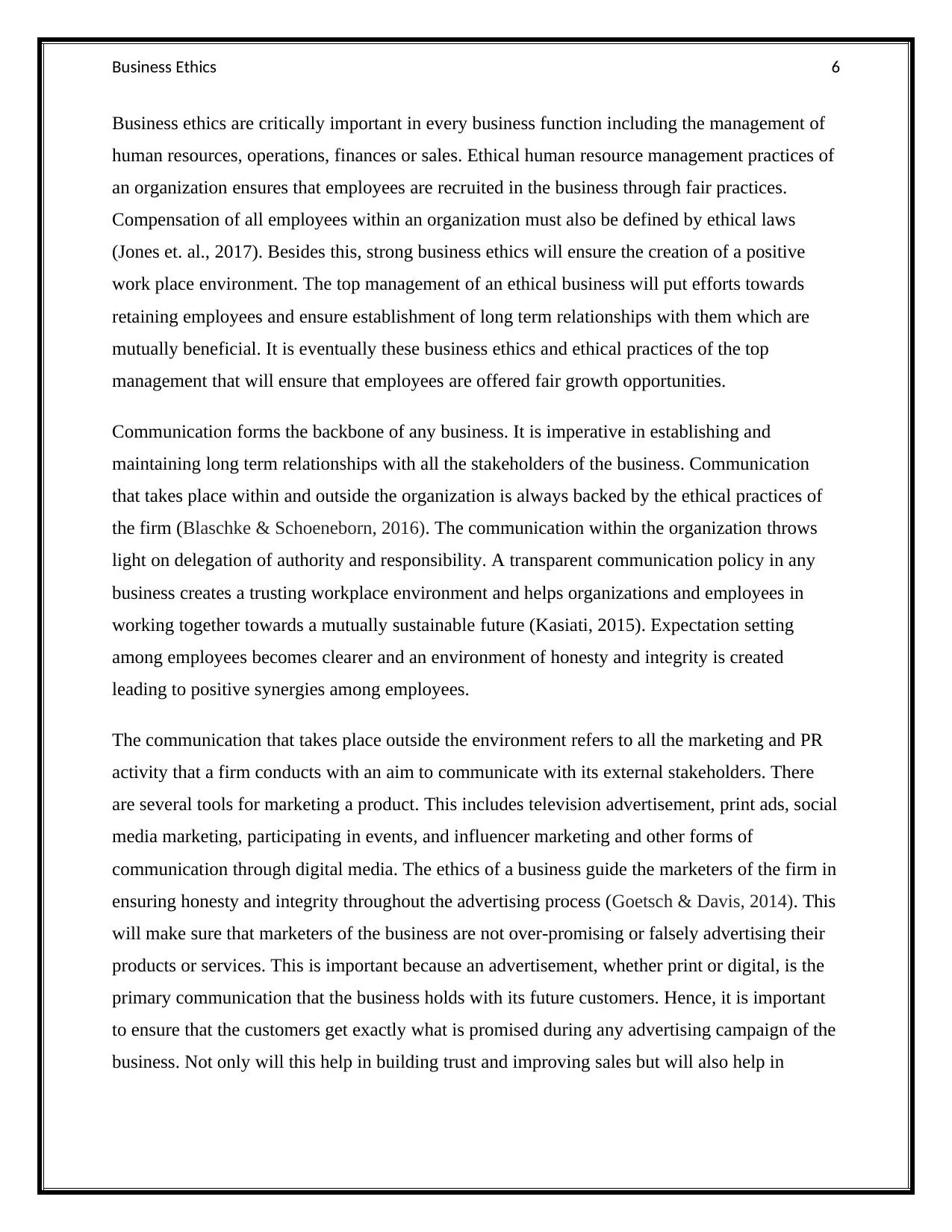
Business Ethics 6
Business ethics are critically important in every business function including the management of
human resources, operations, finances or sales. Ethical human resource management practices of
an organization ensures that employees are recruited in the business through fair practices.
Compensation of all employees within an organization must also be defined by ethical laws
(Jones et. al., 2017). Besides this, strong business ethics will ensure the creation of a positive
work place environment. The top management of an ethical business will put efforts towards
retaining employees and ensure establishment of long term relationships with them which are
mutually beneficial. It is eventually these business ethics and ethical practices of the top
management that will ensure that employees are offered fair growth opportunities.
Communication forms the backbone of any business. It is imperative in establishing and
maintaining long term relationships with all the stakeholders of the business. Communication
that takes place within and outside the organization is always backed by the ethical practices of
the firm (Blaschke & Schoeneborn, 2016). The communication within the organization throws
light on delegation of authority and responsibility. A transparent communication policy in any
business creates a trusting workplace environment and helps organizations and employees in
working together towards a mutually sustainable future (Kasiati, 2015). Expectation setting
among employees becomes clearer and an environment of honesty and integrity is created
leading to positive synergies among employees.
The communication that takes place outside the environment refers to all the marketing and PR
activity that a firm conducts with an aim to communicate with its external stakeholders. There
are several tools for marketing a product. This includes television advertisement, print ads, social
media marketing, participating in events, and influencer marketing and other forms of
communication through digital media. The ethics of a business guide the marketers of the firm in
ensuring honesty and integrity throughout the advertising process (Goetsch & Davis, 2014). This
will make sure that marketers of the business are not over-promising or falsely advertising their
products or services. This is important because an advertisement, whether print or digital, is the
primary communication that the business holds with its future customers. Hence, it is important
to ensure that the customers get exactly what is promised during any advertising campaign of the
business. Not only will this help in building trust and improving sales but will also help in
Business ethics are critically important in every business function including the management of
human resources, operations, finances or sales. Ethical human resource management practices of
an organization ensures that employees are recruited in the business through fair practices.
Compensation of all employees within an organization must also be defined by ethical laws
(Jones et. al., 2017). Besides this, strong business ethics will ensure the creation of a positive
work place environment. The top management of an ethical business will put efforts towards
retaining employees and ensure establishment of long term relationships with them which are
mutually beneficial. It is eventually these business ethics and ethical practices of the top
management that will ensure that employees are offered fair growth opportunities.
Communication forms the backbone of any business. It is imperative in establishing and
maintaining long term relationships with all the stakeholders of the business. Communication
that takes place within and outside the organization is always backed by the ethical practices of
the firm (Blaschke & Schoeneborn, 2016). The communication within the organization throws
light on delegation of authority and responsibility. A transparent communication policy in any
business creates a trusting workplace environment and helps organizations and employees in
working together towards a mutually sustainable future (Kasiati, 2015). Expectation setting
among employees becomes clearer and an environment of honesty and integrity is created
leading to positive synergies among employees.
The communication that takes place outside the environment refers to all the marketing and PR
activity that a firm conducts with an aim to communicate with its external stakeholders. There
are several tools for marketing a product. This includes television advertisement, print ads, social
media marketing, participating in events, and influencer marketing and other forms of
communication through digital media. The ethics of a business guide the marketers of the firm in
ensuring honesty and integrity throughout the advertising process (Goetsch & Davis, 2014). This
will make sure that marketers of the business are not over-promising or falsely advertising their
products or services. This is important because an advertisement, whether print or digital, is the
primary communication that the business holds with its future customers. Hence, it is important
to ensure that the customers get exactly what is promised during any advertising campaign of the
business. Not only will this help in building trust and improving sales but will also help in
Paraphrase This Document
Need a fresh take? Get an instant paraphrase of this document with our AI Paraphraser
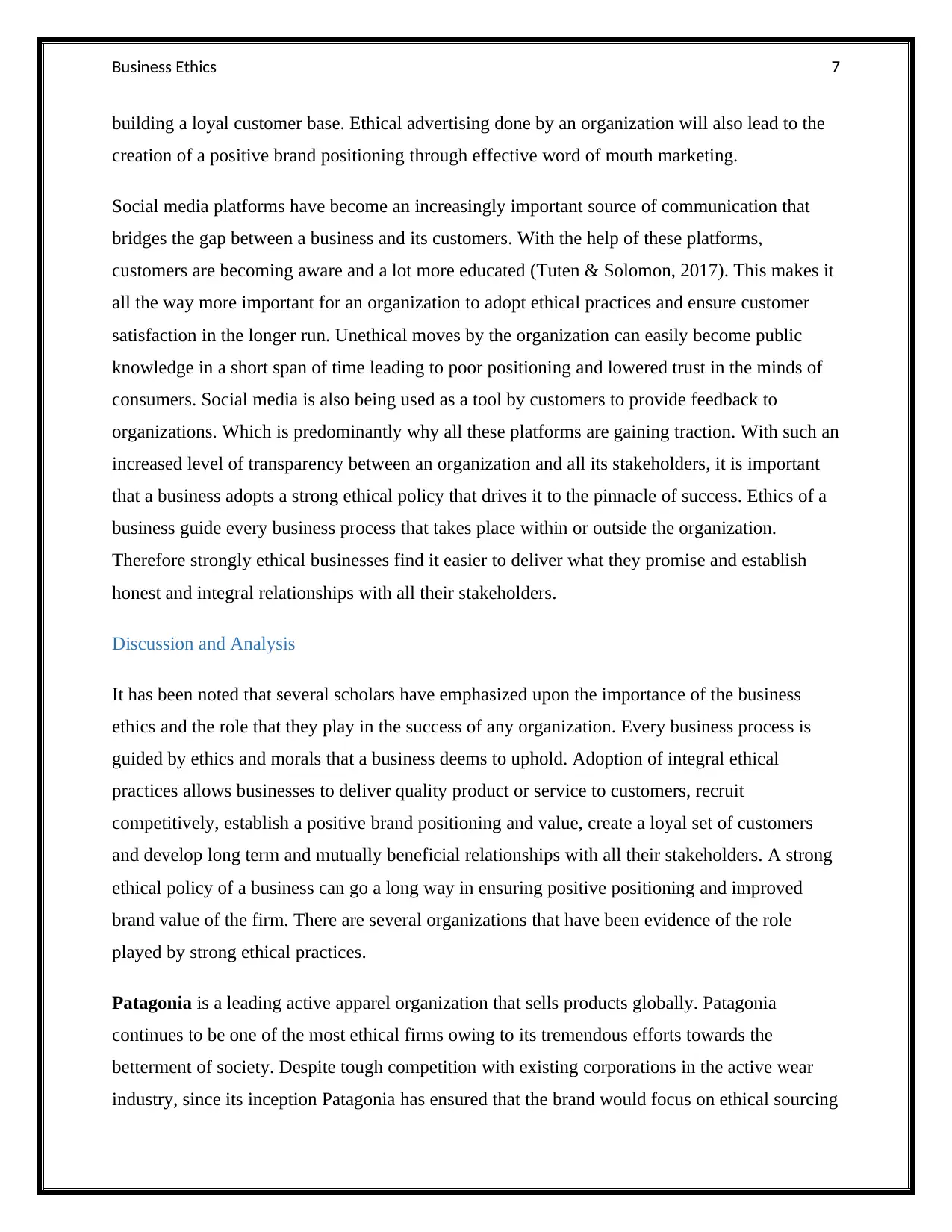
Business Ethics 7
building a loyal customer base. Ethical advertising done by an organization will also lead to the
creation of a positive brand positioning through effective word of mouth marketing.
Social media platforms have become an increasingly important source of communication that
bridges the gap between a business and its customers. With the help of these platforms,
customers are becoming aware and a lot more educated (Tuten & Solomon, 2017). This makes it
all the way more important for an organization to adopt ethical practices and ensure customer
satisfaction in the longer run. Unethical moves by the organization can easily become public
knowledge in a short span of time leading to poor positioning and lowered trust in the minds of
consumers. Social media is also being used as a tool by customers to provide feedback to
organizations. Which is predominantly why all these platforms are gaining traction. With such an
increased level of transparency between an organization and all its stakeholders, it is important
that a business adopts a strong ethical policy that drives it to the pinnacle of success. Ethics of a
business guide every business process that takes place within or outside the organization.
Therefore strongly ethical businesses find it easier to deliver what they promise and establish
honest and integral relationships with all their stakeholders.
Discussion and Analysis
It has been noted that several scholars have emphasized upon the importance of the business
ethics and the role that they play in the success of any organization. Every business process is
guided by ethics and morals that a business deems to uphold. Adoption of integral ethical
practices allows businesses to deliver quality product or service to customers, recruit
competitively, establish a positive brand positioning and value, create a loyal set of customers
and develop long term and mutually beneficial relationships with all their stakeholders. A strong
ethical policy of a business can go a long way in ensuring positive positioning and improved
brand value of the firm. There are several organizations that have been evidence of the role
played by strong ethical practices.
Patagonia is a leading active apparel organization that sells products globally. Patagonia
continues to be one of the most ethical firms owing to its tremendous efforts towards the
betterment of society. Despite tough competition with existing corporations in the active wear
industry, since its inception Patagonia has ensured that the brand would focus on ethical sourcing
building a loyal customer base. Ethical advertising done by an organization will also lead to the
creation of a positive brand positioning through effective word of mouth marketing.
Social media platforms have become an increasingly important source of communication that
bridges the gap between a business and its customers. With the help of these platforms,
customers are becoming aware and a lot more educated (Tuten & Solomon, 2017). This makes it
all the way more important for an organization to adopt ethical practices and ensure customer
satisfaction in the longer run. Unethical moves by the organization can easily become public
knowledge in a short span of time leading to poor positioning and lowered trust in the minds of
consumers. Social media is also being used as a tool by customers to provide feedback to
organizations. Which is predominantly why all these platforms are gaining traction. With such an
increased level of transparency between an organization and all its stakeholders, it is important
that a business adopts a strong ethical policy that drives it to the pinnacle of success. Ethics of a
business guide every business process that takes place within or outside the organization.
Therefore strongly ethical businesses find it easier to deliver what they promise and establish
honest and integral relationships with all their stakeholders.
Discussion and Analysis
It has been noted that several scholars have emphasized upon the importance of the business
ethics and the role that they play in the success of any organization. Every business process is
guided by ethics and morals that a business deems to uphold. Adoption of integral ethical
practices allows businesses to deliver quality product or service to customers, recruit
competitively, establish a positive brand positioning and value, create a loyal set of customers
and develop long term and mutually beneficial relationships with all their stakeholders. A strong
ethical policy of a business can go a long way in ensuring positive positioning and improved
brand value of the firm. There are several organizations that have been evidence of the role
played by strong ethical practices.
Patagonia is a leading active apparel organization that sells products globally. Patagonia
continues to be one of the most ethical firms owing to its tremendous efforts towards the
betterment of society. Despite tough competition with existing corporations in the active wear
industry, since its inception Patagonia has ensured that the brand would focus on ethical sourcing
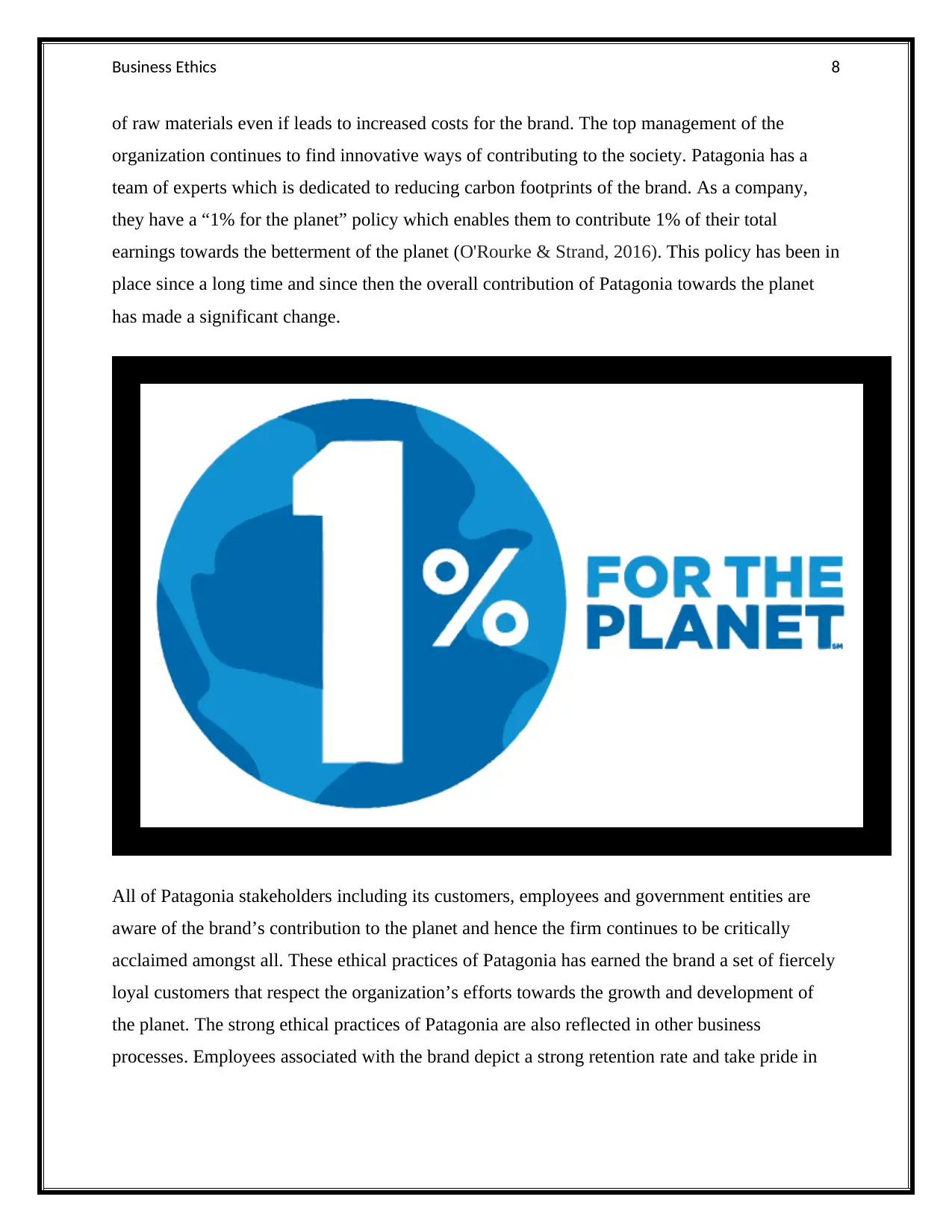
Business Ethics 8
of raw materials even if leads to increased costs for the brand. The top management of the
organization continues to find innovative ways of contributing to the society. Patagonia has a
team of experts which is dedicated to reducing carbon footprints of the brand. As a company,
they have a “1% for the planet” policy which enables them to contribute 1% of their total
earnings towards the betterment of the planet (O'Rourke & Strand, 2016). This policy has been in
place since a long time and since then the overall contribution of Patagonia towards the planet
has made a significant change.
All of Patagonia stakeholders including its customers, employees and government entities are
aware of the brand’s contribution to the planet and hence the firm continues to be critically
acclaimed amongst all. These ethical practices of Patagonia has earned the brand a set of fiercely
loyal customers that respect the organization’s efforts towards the growth and development of
the planet. The strong ethical practices of Patagonia are also reflected in other business
processes. Employees associated with the brand depict a strong retention rate and take pride in
of raw materials even if leads to increased costs for the brand. The top management of the
organization continues to find innovative ways of contributing to the society. Patagonia has a
team of experts which is dedicated to reducing carbon footprints of the brand. As a company,
they have a “1% for the planet” policy which enables them to contribute 1% of their total
earnings towards the betterment of the planet (O'Rourke & Strand, 2016). This policy has been in
place since a long time and since then the overall contribution of Patagonia towards the planet
has made a significant change.
All of Patagonia stakeholders including its customers, employees and government entities are
aware of the brand’s contribution to the planet and hence the firm continues to be critically
acclaimed amongst all. These ethical practices of Patagonia has earned the brand a set of fiercely
loyal customers that respect the organization’s efforts towards the growth and development of
the planet. The strong ethical practices of Patagonia are also reflected in other business
processes. Employees associated with the brand depict a strong retention rate and take pride in
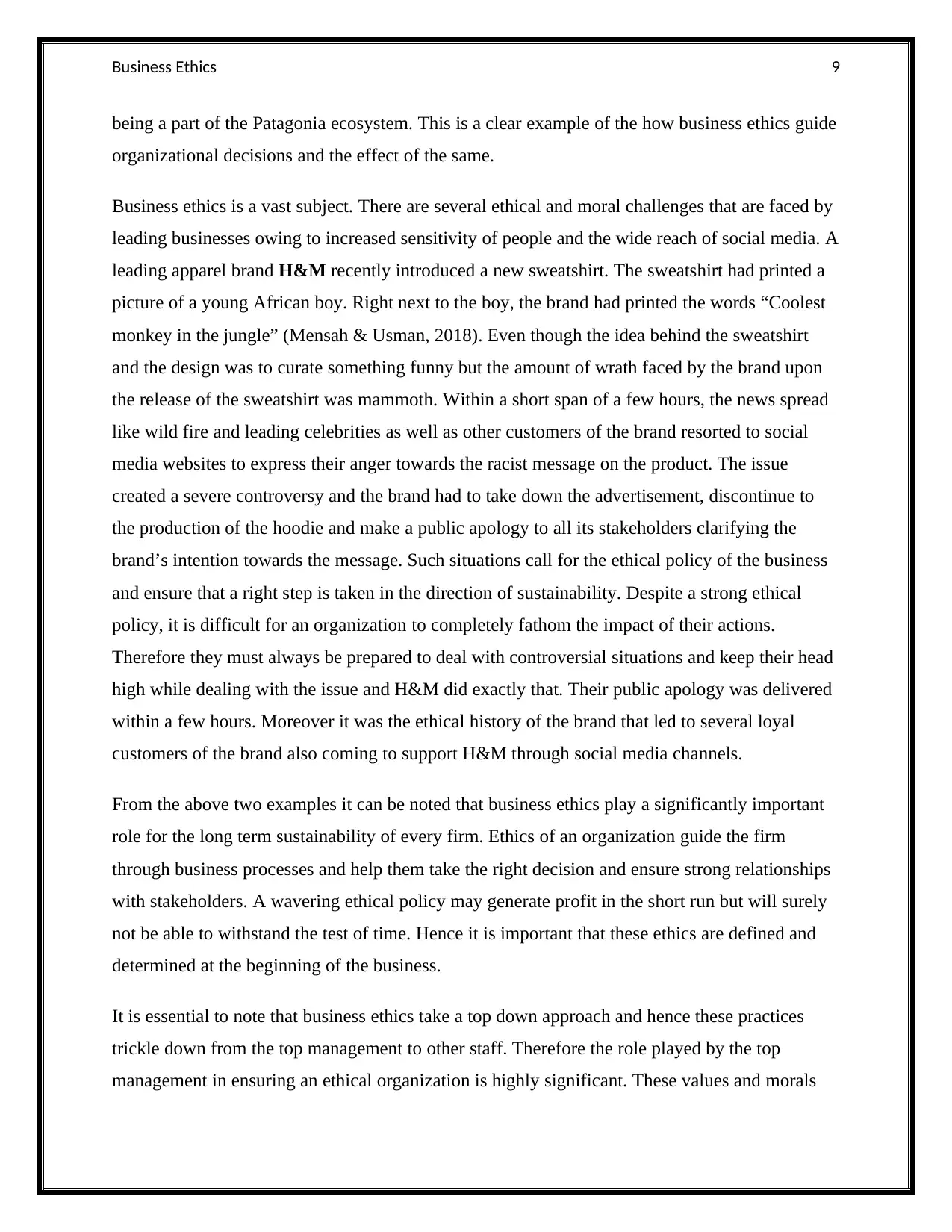
Business Ethics 9
being a part of the Patagonia ecosystem. This is a clear example of the how business ethics guide
organizational decisions and the effect of the same.
Business ethics is a vast subject. There are several ethical and moral challenges that are faced by
leading businesses owing to increased sensitivity of people and the wide reach of social media. A
leading apparel brand H&M recently introduced a new sweatshirt. The sweatshirt had printed a
picture of a young African boy. Right next to the boy, the brand had printed the words “Coolest
monkey in the jungle” (Mensah & Usman, 2018). Even though the idea behind the sweatshirt
and the design was to curate something funny but the amount of wrath faced by the brand upon
the release of the sweatshirt was mammoth. Within a short span of a few hours, the news spread
like wild fire and leading celebrities as well as other customers of the brand resorted to social
media websites to express their anger towards the racist message on the product. The issue
created a severe controversy and the brand had to take down the advertisement, discontinue to
the production of the hoodie and make a public apology to all its stakeholders clarifying the
brand’s intention towards the message. Such situations call for the ethical policy of the business
and ensure that a right step is taken in the direction of sustainability. Despite a strong ethical
policy, it is difficult for an organization to completely fathom the impact of their actions.
Therefore they must always be prepared to deal with controversial situations and keep their head
high while dealing with the issue and H&M did exactly that. Their public apology was delivered
within a few hours. Moreover it was the ethical history of the brand that led to several loyal
customers of the brand also coming to support H&M through social media channels.
From the above two examples it can be noted that business ethics play a significantly important
role for the long term sustainability of every firm. Ethics of an organization guide the firm
through business processes and help them take the right decision and ensure strong relationships
with stakeholders. A wavering ethical policy may generate profit in the short run but will surely
not be able to withstand the test of time. Hence it is important that these ethics are defined and
determined at the beginning of the business.
It is essential to note that business ethics take a top down approach and hence these practices
trickle down from the top management to other staff. Therefore the role played by the top
management in ensuring an ethical organization is highly significant. These values and morals
being a part of the Patagonia ecosystem. This is a clear example of the how business ethics guide
organizational decisions and the effect of the same.
Business ethics is a vast subject. There are several ethical and moral challenges that are faced by
leading businesses owing to increased sensitivity of people and the wide reach of social media. A
leading apparel brand H&M recently introduced a new sweatshirt. The sweatshirt had printed a
picture of a young African boy. Right next to the boy, the brand had printed the words “Coolest
monkey in the jungle” (Mensah & Usman, 2018). Even though the idea behind the sweatshirt
and the design was to curate something funny but the amount of wrath faced by the brand upon
the release of the sweatshirt was mammoth. Within a short span of a few hours, the news spread
like wild fire and leading celebrities as well as other customers of the brand resorted to social
media websites to express their anger towards the racist message on the product. The issue
created a severe controversy and the brand had to take down the advertisement, discontinue to
the production of the hoodie and make a public apology to all its stakeholders clarifying the
brand’s intention towards the message. Such situations call for the ethical policy of the business
and ensure that a right step is taken in the direction of sustainability. Despite a strong ethical
policy, it is difficult for an organization to completely fathom the impact of their actions.
Therefore they must always be prepared to deal with controversial situations and keep their head
high while dealing with the issue and H&M did exactly that. Their public apology was delivered
within a few hours. Moreover it was the ethical history of the brand that led to several loyal
customers of the brand also coming to support H&M through social media channels.
From the above two examples it can be noted that business ethics play a significantly important
role for the long term sustainability of every firm. Ethics of an organization guide the firm
through business processes and help them take the right decision and ensure strong relationships
with stakeholders. A wavering ethical policy may generate profit in the short run but will surely
not be able to withstand the test of time. Hence it is important that these ethics are defined and
determined at the beginning of the business.
It is essential to note that business ethics take a top down approach and hence these practices
trickle down from the top management to other staff. Therefore the role played by the top
management in ensuring an ethical organization is highly significant. These values and morals
Secure Best Marks with AI Grader
Need help grading? Try our AI Grader for instant feedback on your assignments.
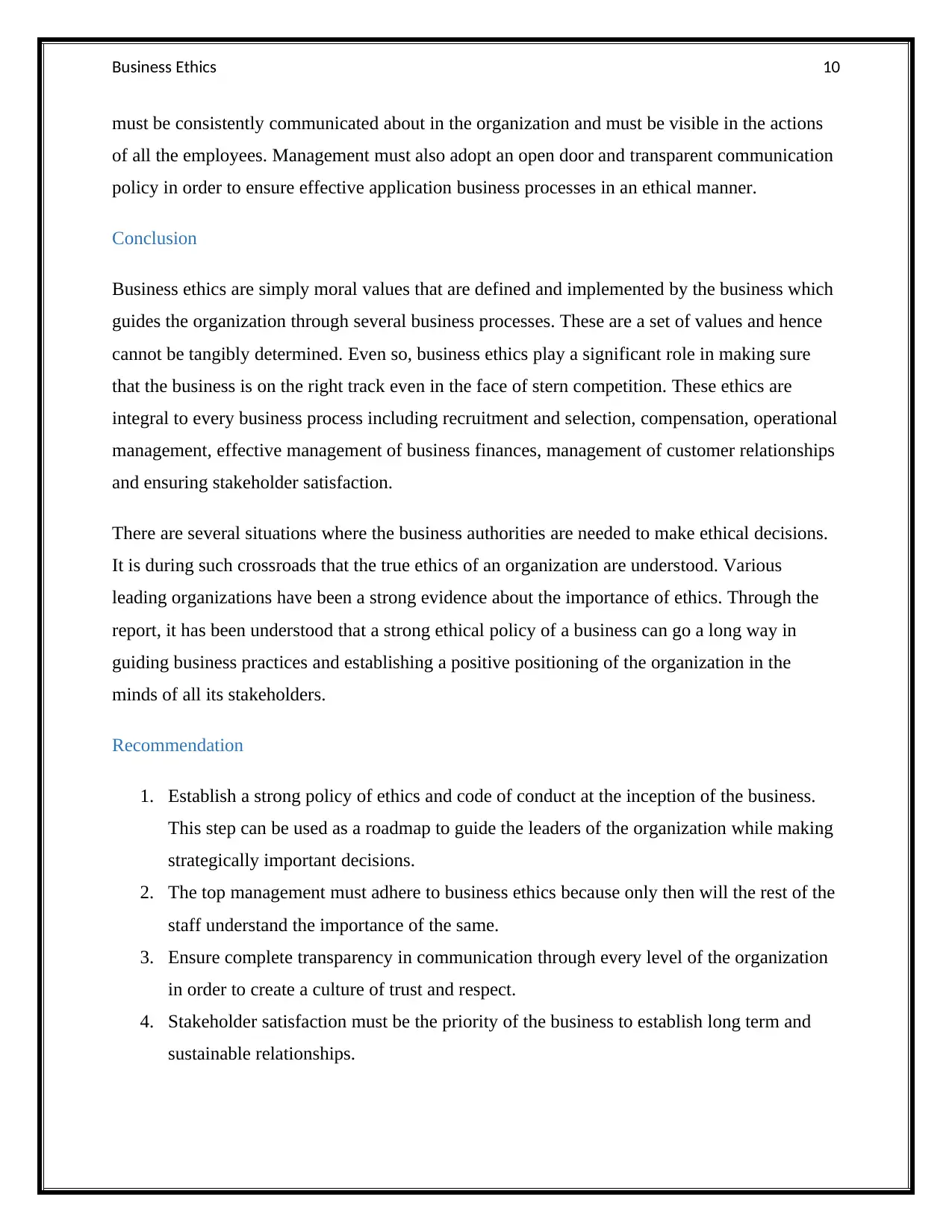
Business Ethics 10
must be consistently communicated about in the organization and must be visible in the actions
of all the employees. Management must also adopt an open door and transparent communication
policy in order to ensure effective application business processes in an ethical manner.
Conclusion
Business ethics are simply moral values that are defined and implemented by the business which
guides the organization through several business processes. These are a set of values and hence
cannot be tangibly determined. Even so, business ethics play a significant role in making sure
that the business is on the right track even in the face of stern competition. These ethics are
integral to every business process including recruitment and selection, compensation, operational
management, effective management of business finances, management of customer relationships
and ensuring stakeholder satisfaction.
There are several situations where the business authorities are needed to make ethical decisions.
It is during such crossroads that the true ethics of an organization are understood. Various
leading organizations have been a strong evidence about the importance of ethics. Through the
report, it has been understood that a strong ethical policy of a business can go a long way in
guiding business practices and establishing a positive positioning of the organization in the
minds of all its stakeholders.
Recommendation
1. Establish a strong policy of ethics and code of conduct at the inception of the business.
This step can be used as a roadmap to guide the leaders of the organization while making
strategically important decisions.
2. The top management must adhere to business ethics because only then will the rest of the
staff understand the importance of the same.
3. Ensure complete transparency in communication through every level of the organization
in order to create a culture of trust and respect.
4. Stakeholder satisfaction must be the priority of the business to establish long term and
sustainable relationships.
must be consistently communicated about in the organization and must be visible in the actions
of all the employees. Management must also adopt an open door and transparent communication
policy in order to ensure effective application business processes in an ethical manner.
Conclusion
Business ethics are simply moral values that are defined and implemented by the business which
guides the organization through several business processes. These are a set of values and hence
cannot be tangibly determined. Even so, business ethics play a significant role in making sure
that the business is on the right track even in the face of stern competition. These ethics are
integral to every business process including recruitment and selection, compensation, operational
management, effective management of business finances, management of customer relationships
and ensuring stakeholder satisfaction.
There are several situations where the business authorities are needed to make ethical decisions.
It is during such crossroads that the true ethics of an organization are understood. Various
leading organizations have been a strong evidence about the importance of ethics. Through the
report, it has been understood that a strong ethical policy of a business can go a long way in
guiding business practices and establishing a positive positioning of the organization in the
minds of all its stakeholders.
Recommendation
1. Establish a strong policy of ethics and code of conduct at the inception of the business.
This step can be used as a roadmap to guide the leaders of the organization while making
strategically important decisions.
2. The top management must adhere to business ethics because only then will the rest of the
staff understand the importance of the same.
3. Ensure complete transparency in communication through every level of the organization
in order to create a culture of trust and respect.
4. Stakeholder satisfaction must be the priority of the business to establish long term and
sustainable relationships.
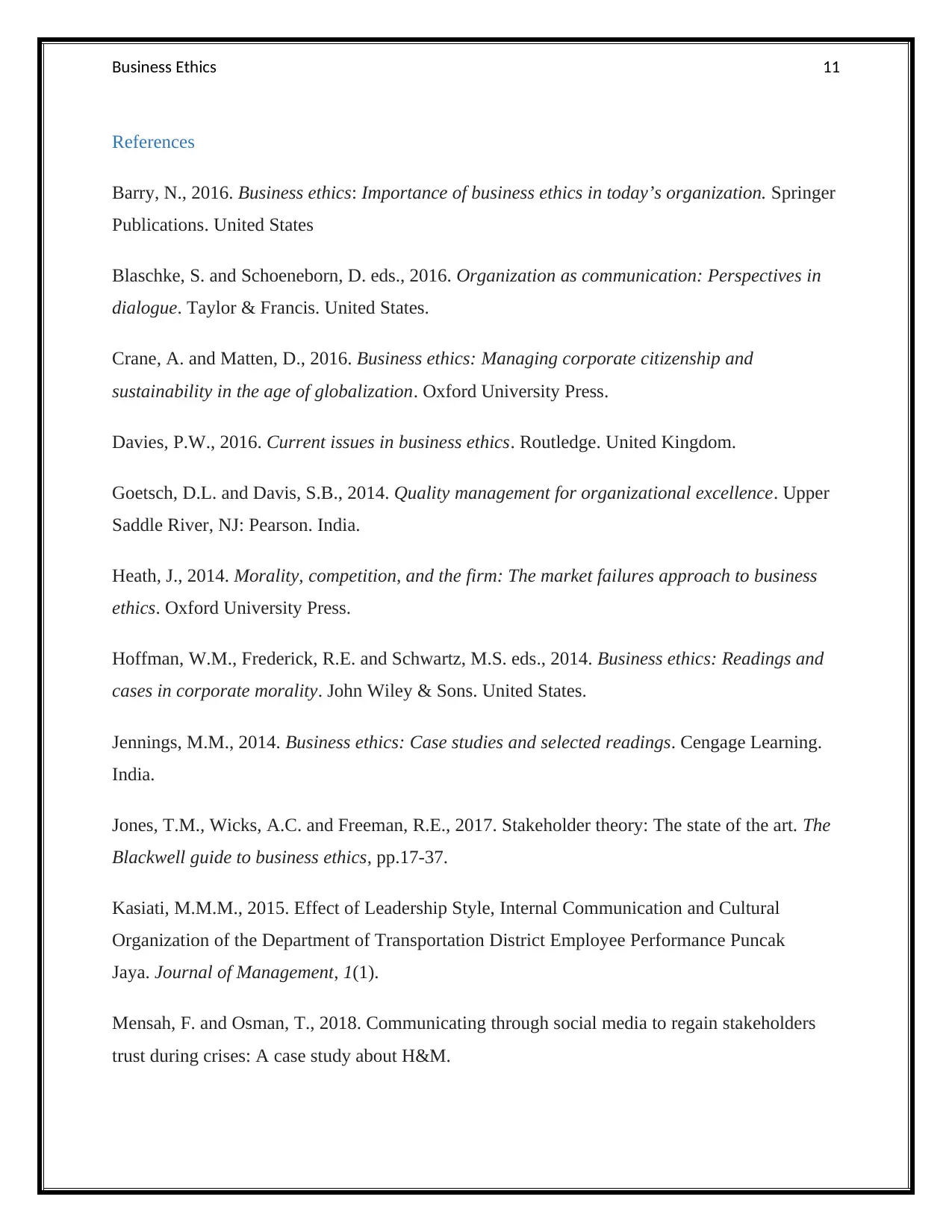
Business Ethics 11
References
Barry, N., 2016. Business ethics: Importance of business ethics in today’s organization. Springer
Publications. United States
Blaschke, S. and Schoeneborn, D. eds., 2016. Organization as communication: Perspectives in
dialogue. Taylor & Francis. United States.
Crane, A. and Matten, D., 2016. Business ethics: Managing corporate citizenship and
sustainability in the age of globalization. Oxford University Press.
Davies, P.W., 2016. Current issues in business ethics. Routledge. United Kingdom.
Goetsch, D.L. and Davis, S.B., 2014. Quality management for organizational excellence. Upper
Saddle River, NJ: Pearson. India.
Heath, J., 2014. Morality, competition, and the firm: The market failures approach to business
ethics. Oxford University Press.
Hoffman, W.M., Frederick, R.E. and Schwartz, M.S. eds., 2014. Business ethics: Readings and
cases in corporate morality. John Wiley & Sons. United States.
Jennings, M.M., 2014. Business ethics: Case studies and selected readings. Cengage Learning.
India.
Jones, T.M., Wicks, A.C. and Freeman, R.E., 2017. Stakeholder theory: The state of the art. The
Blackwell guide to business ethics, pp.17-37.
Kasiati, M.M.M., 2015. Effect of Leadership Style, Internal Communication and Cultural
Organization of the Department of Transportation District Employee Performance Puncak
Jaya. Journal of Management, 1(1).
Mensah, F. and Osman, T., 2018. Communicating through social media to regain stakeholders
trust during crises: A case study about H&M.
References
Barry, N., 2016. Business ethics: Importance of business ethics in today’s organization. Springer
Publications. United States
Blaschke, S. and Schoeneborn, D. eds., 2016. Organization as communication: Perspectives in
dialogue. Taylor & Francis. United States.
Crane, A. and Matten, D., 2016. Business ethics: Managing corporate citizenship and
sustainability in the age of globalization. Oxford University Press.
Davies, P.W., 2016. Current issues in business ethics. Routledge. United Kingdom.
Goetsch, D.L. and Davis, S.B., 2014. Quality management for organizational excellence. Upper
Saddle River, NJ: Pearson. India.
Heath, J., 2014. Morality, competition, and the firm: The market failures approach to business
ethics. Oxford University Press.
Hoffman, W.M., Frederick, R.E. and Schwartz, M.S. eds., 2014. Business ethics: Readings and
cases in corporate morality. John Wiley & Sons. United States.
Jennings, M.M., 2014. Business ethics: Case studies and selected readings. Cengage Learning.
India.
Jones, T.M., Wicks, A.C. and Freeman, R.E., 2017. Stakeholder theory: The state of the art. The
Blackwell guide to business ethics, pp.17-37.
Kasiati, M.M.M., 2015. Effect of Leadership Style, Internal Communication and Cultural
Organization of the Department of Transportation District Employee Performance Puncak
Jaya. Journal of Management, 1(1).
Mensah, F. and Osman, T., 2018. Communicating through social media to regain stakeholders
trust during crises: A case study about H&M.
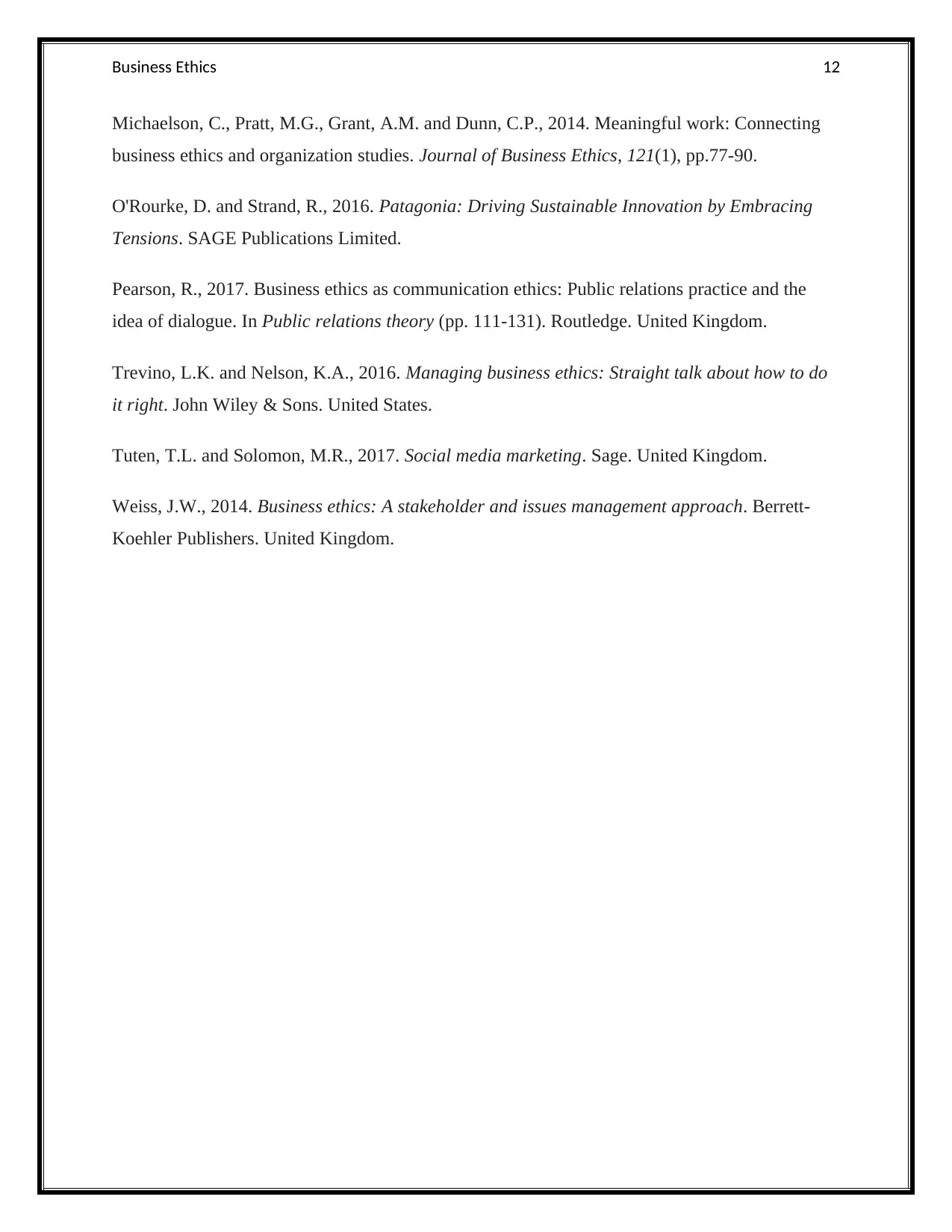
Business Ethics 12
Michaelson, C., Pratt, M.G., Grant, A.M. and Dunn, C.P., 2014. Meaningful work: Connecting
business ethics and organization studies. Journal of Business Ethics, 121(1), pp.77-90.
O'Rourke, D. and Strand, R., 2016. Patagonia: Driving Sustainable Innovation by Embracing
Tensions. SAGE Publications Limited.
Pearson, R., 2017. Business ethics as communication ethics: Public relations practice and the
idea of dialogue. In Public relations theory (pp. 111-131). Routledge. United Kingdom.
Trevino, L.K. and Nelson, K.A., 2016. Managing business ethics: Straight talk about how to do
it right. John Wiley & Sons. United States.
Tuten, T.L. and Solomon, M.R., 2017. Social media marketing. Sage. United Kingdom.
Weiss, J.W., 2014. Business ethics: A stakeholder and issues management approach. Berrett-
Koehler Publishers. United Kingdom.
Michaelson, C., Pratt, M.G., Grant, A.M. and Dunn, C.P., 2014. Meaningful work: Connecting
business ethics and organization studies. Journal of Business Ethics, 121(1), pp.77-90.
O'Rourke, D. and Strand, R., 2016. Patagonia: Driving Sustainable Innovation by Embracing
Tensions. SAGE Publications Limited.
Pearson, R., 2017. Business ethics as communication ethics: Public relations practice and the
idea of dialogue. In Public relations theory (pp. 111-131). Routledge. United Kingdom.
Trevino, L.K. and Nelson, K.A., 2016. Managing business ethics: Straight talk about how to do
it right. John Wiley & Sons. United States.
Tuten, T.L. and Solomon, M.R., 2017. Social media marketing. Sage. United Kingdom.
Weiss, J.W., 2014. Business ethics: A stakeholder and issues management approach. Berrett-
Koehler Publishers. United Kingdom.
1 out of 13
Related Documents
Your All-in-One AI-Powered Toolkit for Academic Success.
+13062052269
info@desklib.com
Available 24*7 on WhatsApp / Email
![[object Object]](/_next/static/media/star-bottom.7253800d.svg)
Unlock your academic potential
© 2024 | Zucol Services PVT LTD | All rights reserved.





